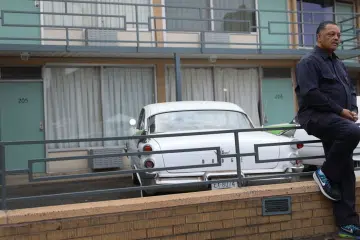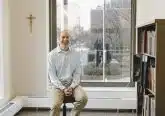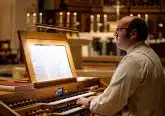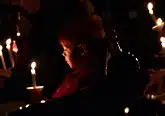Faith & Science Go Together!
According to a recent Pew Research study, half of U.S. adults say that science and religion are “mostly in conflict,” while 47 percent say that
science and religion are “mostly compatible.” Three percent said “I don’t know” or refused to answer. The harmony (or apparent lack thereof) between Christian doctrine and science has long been debated, and people are as divided as ever.
The strictly materialistic worldview that has increasingly plagued western culture since the Enlightenment continues leading countless people (especially the young) away from the truth of the Catholic Church to seek answers elsewhere. The impact has been detrimental for the Church and heartbreaking for families.
According to popular Catholic speaker and physicist Father Robert J. Spitzer, S.J., Ph.D., it’s time for Catholics to up their game when it comes to apologetics—the art of defending the faith with logic and evidence.
“There has been an incredible shift in the scientific community toward belief in God,” Father Spitzer said, “but if we don’t give that evidence to our children—evidence for life after death, the transphysical soul, the authenticity of the Gospels—and if we allow the attrition rate to continue going the way it is for the next 25 years, we will have a church that is half the size of what it is now.”
Father Spitzer hosts the weekly EWTN television show, “Fr. Spitzer’s Universe,” and is president of the Magis Center of Reason and Faith. The Center’s mission is to create content that helps people find a higher purpose in life, an awareness of their transcendent dignity, a sense of the transcendent Providential Power who guides them, and a determination to live ethically responsible lives. It provides a plethora of resources for educators, parish leaders, and anyone interested in contemporary Catholic commentary on timeless topics.
“There’s just no reason why a young person should think that faith and science are contradictory,” said Father Spitzer. “It’s just the opposite.”
He said it is important for young people to understand that science can’t answer all their questions, and good science leads people to God.
“Science seeks to observe the principles of nature. The world is rational and ordered because of the God who created it,” Father Spitzer said.
Father Spitzer also sees phenomena and experiences that can’t be explained by science as powerful tools for apologetics.
“We need to tell people about Eucharistic miracles, the Shroud of Turin, near-death experiences, and Marian apparitions—things that are naturalistically and scientifically inexplicable,” he said. “Close examination of these miracles can be quite profound and beautiful.”
Father Spitzer will visit the Archdiocese of Cincinnati in September to lead a Catholic Faith and Science workshop for archdiocesan schools’ principals and math, science, and religion teachers. The archdiocesan Catholic Schools Office and Sophia Institute for Teachers collaborated to sponsor the event. Father Spitzer plans to share concepts that teachers can explore with their students to help arm them against the biases of atheism, relativism, and scientism.
“We cannot allow our students to go to college totally disarmed and vulnerable to attacks on our faith from not only their peers but their professors as well,” said Father Spitzer. “They are getting blasted by people who are arrogant and incorrect, and we’ve got the evidence to refute it. We must give them a good, strong, scientifically based foundation for their faith to bloom.”
Those interested in learning more about the Magis Center and all the articles, videos, books, and wealth of knowledge the center supplies can visit www.magiscenter.com. ✣
This article appeared in the September 2025 edition of The Catholic Telegraph Magazine. For your complimentary subscription, click here.














